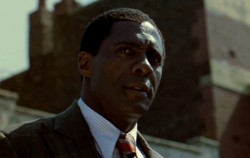Mandela:
Long Walk To Freedom

In light of his recent death, any movie review criticizing Mandela:
Long Walk To Freedom likely will face heat because most people
can’t understand how criticism of the movie is not criticism of
the man, but let’s give it a try anyway (and just stop reading
now if you are going to be all angry when I don’t like it all
that much).
Idris Elba stars as Nelson Mandela and we see his life from leaving his
home to working as a lawyer to protect South Africans faced with a
racist society and law, and, ultimately, turning his energies to
fighting for the civil rights of black South Africans legally
discriminated against by a white minority employing violence and force
to maintain order and adherence to illogical and unjustifiable laws.
 Mandela: Long Walk To Freedom is a
straight forward collection of scenes from a life rather than a well
told story or examination of what made Mandela tick, so, if you are
looking for more, you might not find it here. Mandela: Long Walk To Freedom is a
straight forward collection of scenes from a life rather than a well
told story or examination of what made Mandela tick, so, if you are
looking for more, you might not find it here.
Sure, writer William Nicholson gives the audience all sorts of moments
to humanize the man as we learn Mandela liked to dance, he liked to
flirt with women, he had troubles with his wife, etc. It’s a
reminder that a hallowed figure is human, but it doesn’t help us
understand what makes him tick or shed much light on what gave him the
strength to persevere in the darkest hours.
Then, we go from moment to moment without enough background to help
shape the situation. If you already know about South Africa’s
history, Mandela: Long Walk to Freedom is a better movie than
if you are wondering why these events are so important or what is
motivating the fight against the government. Those under 40 might need
a history lesson or two to appreciate it.
However, Nicholson and director Justin Chadwick do a fantastic job with
the hardest to grasp part of Mandela’s legacy. The two show us
the African National Congress actively engaging in a revolution that
does include violence.
In the most dramatic and climactic part of the movie, the audience is
given the most perfect debate on the issue. Is the African National
Congress using violence as terrorists or are they uprising against the
violence used against them every day? Much like the British would argue
Samuel Adams and the gang were terrorists for dumping tea in Boston
Harbor, the audience can see how these acts, that did lead to
Mandela’s long imprisonment, were fighting back and not
terrorism. It’s an impassioned explanation that Elba delivers
like a champ in the film’s true climax.
I would have liked more about why Mandela was still a prominent figure
in South Africa during his imprisonment (quite to the contrary, we are
given young characters who show the opposite), but we did get to learn
more about Mandela’s prison time, as well as the infuriating
treatment of Winnie Mandela (Naomie Harris, in a performance that
should not be forgotten).
Elba is great, but he can’t make up for the deficiencies.
Mandela: Long Walk to Freedom is rated PG-13
for some intense sequences of violence and disturbing images, sexual
content and brief strong language.
|